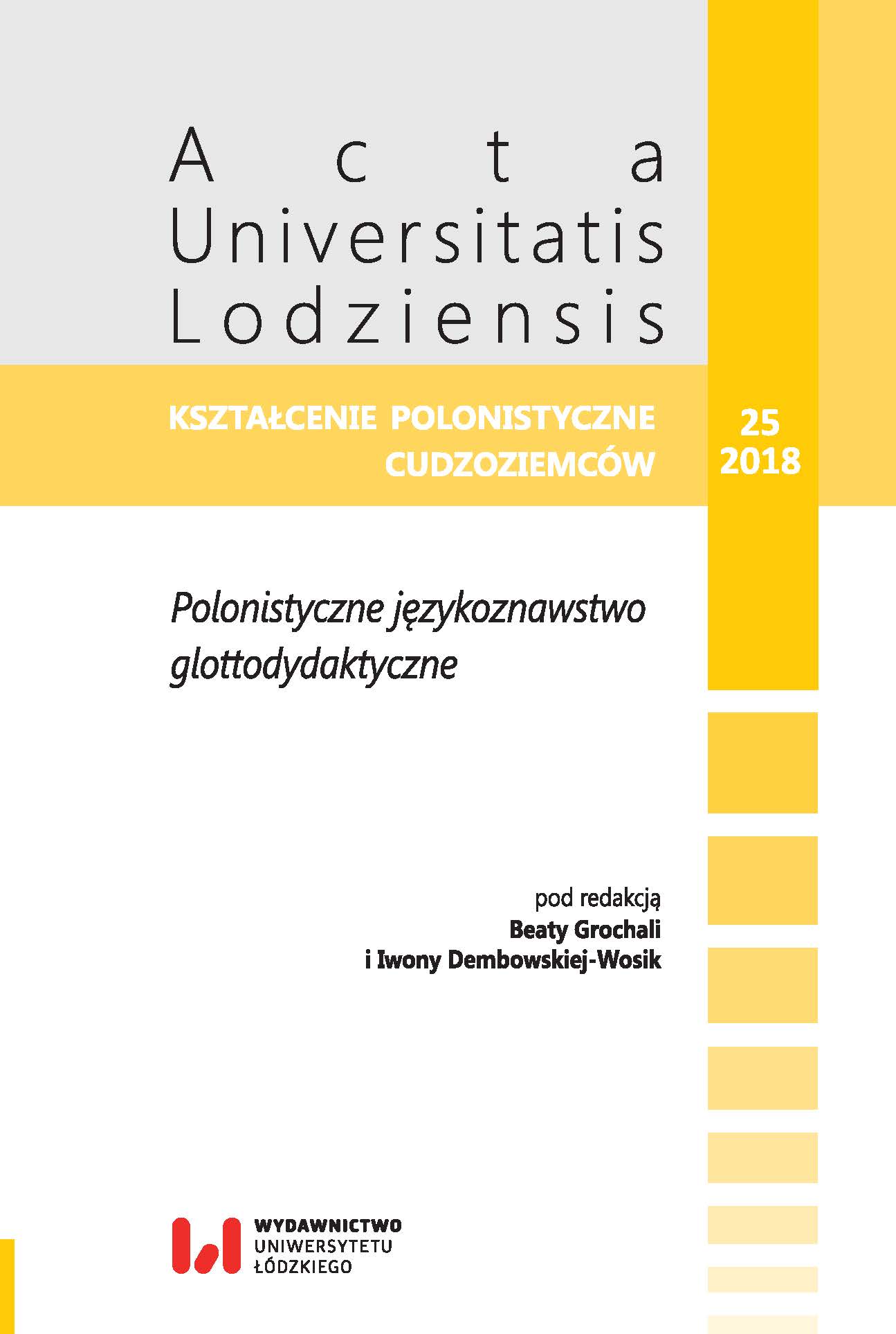Positional equivalence of syntactic structures in language teaching theory and practice
DOI:
https://doi.org/10.18778/0860-6587.25.09Keywords:
syntax, teaching Polish as a foreign language, valency, alternative syntax structures, positional equivalenceAbstract
The article discusses the problem of alternative connectivity of lexical units. This phenomenon, which we called positional equivalence, is analyzed from the perspective of teaching Polish as a foreign language (PFL). The paper consists of two parts. The first defines the concept of positional equivalence. The second part analyzes the way positional equivalence is presented and explained in teaching practice. The analysis of PFL teaching materials clearly shows the need to systematize and update the descriptions of syntactic features of different lexical units, taking into consideration their communicative function and stylistic features. It also seems necessary to enrich the existing language exercises with tasks allowing the students to practice their knowledge of alternative syntactic structures and the ability to adjust the structures they use to the type of communicative situation.
References
Bogusławski A., Danielewiczowa M., 2005, Verba polona abscondita. Sonda słownikowa III, Warszawa.
Google Scholar
Bogusławski A., Wawrzyńczyk J., 1993, Polszczyzna, jaką znamy. Nowa sonda słownikowa, Warszawa.
Google Scholar
Buttler D., 1976, Innowacje składniowe współczesnej polszczyzny, Warszawa.
Google Scholar
Bühler K., 2004, Teoria języka, Kraków.
Google Scholar
Gębka-Wolak M., 2011, Pozycje składniowe frazy bezokolicznikowej we współczesnym zdaniu polskim, Toruń.
Google Scholar
Gębka-Wolak, A. Moroz. (w druku), Jednostka tekstu prawnego w ujęciu teoretycznym i praktycznym, Toruń.
Google Scholar
Inny słownik języka polskiego, 2000, pod red. M. Bańki, Warszawa.
Google Scholar
Kaleta Z., 1995, Gramatyka języka polskiego dla cudzoziemców, Kraków.
Google Scholar
Karolak S., 2002, Podstawowe struktury składniowe języka polskiego, Warszawa.
Google Scholar
Kawka M., 1980, Słownik syntaktyczno-semantyczny czasowników polskich, Kraków.
Google Scholar
Kita M., 1998, Wybieram gramatykę, t. 2, Katowice.
Google Scholar
Madelska L., Warchoł-Schlottmann M., 2008, Odkrywamy język polski. Gramatyka dla uczących (się) języka polskiego jako obcego, Kraków.
Google Scholar
Lipińska E., Dąmbska E.G., 2007 Kiedyś wrócisz tu… cz. II: By szukać swoich dróg i gwiazd, Kraków.
Google Scholar
Mazur B. W., 2011, Colloquial Polish: the complete course for beginners, New York.
Google Scholar
Mędak S., 2002, Co z czym. Ćwiczenia składniowe dla grup zaawansowanych, Kraków.
Google Scholar
Mędak S., 2011, Praktyczny słownik łączliwości składniowej czasowników polskich, Kraków.
Google Scholar
Mędak S., 2014, Polski C2. Megatest, Warszawa.
Google Scholar
Mielczuk (1974): Mel’čuk I.A., 1974, Opyt teorii lingvističeskih modelej Smysl ↔ Tekst, Moskwa.
Google Scholar
Mielczuk (2015): Mel’čuk I.A., 2015, A General Inventory of Surface-Syntactic Relations in World Languages. Part One, „RSUH/RGGU BULLETIN. Moscow Journal of Linguistics”, nr 8, s. 75–103.
Google Scholar
Mielczuk (2016): Mel’čuk I.A., 2016, A General Inventory of Surface-Syntactic Relations in World Languages. Part Two, „RSUH/RGGU BULLETIN. Moscow Journal of Linguistics”, nr 9, s. 94–120.
Google Scholar
NKJP: Narodowy Korpus Języka Polskiego [online], http://nkjp.pl/ [27.04.2018].
Google Scholar
Polski słownik walencyjny „Walenty” [online], http://walenty.clarin-pl.eu [27.04.2018].
Google Scholar
Porayski-Pomsta J. (red.), 2010, Nauka o języku polskim dla cudzoziemców, Warszawa.
Google Scholar
Stempek A. i in., 2010, Polski krok po kroku 1, Kraków.
Google Scholar
Tesnière L., 1959, Eléménts de syntaxe structurale, Paris.
Google Scholar
Wielki słownik języka polskiego, pod red. P. Żmigrodzkiego [online], http://www.wsjp.pl/ [27.04.2018].
Google Scholar
Zaron Z., 1980, Ze studiów nad składnią i semantyką czasownika. Polskie czasowniki z uzupełnieniem werbalnym oznaczające relację osobową z argumentem zdarzeniowym, Wrocław.
Google Scholar
Zaron Z., 2009, Problemy składni funkcjonalnej, Warszawa.
Google Scholar
Zaron, Z., 2012, Konotacja nie jedno ma imię. Wymagania składniowe nazw osobowych, w: J. Apresjan, I. Boguslavsky i in. (red.), Meaning, Texts and other Exciting Things. A Festschrift to Commemorate the 80th Anniversary of Professor Igor Alexandrovič Mel’čuk, Moskva, s. 672–681.
Google Scholar
Downloads
Published
How to Cite
Issue
Section
License

This work is licensed under a Creative Commons Attribution-NonCommercial-NoDerivatives 4.0 International License.










